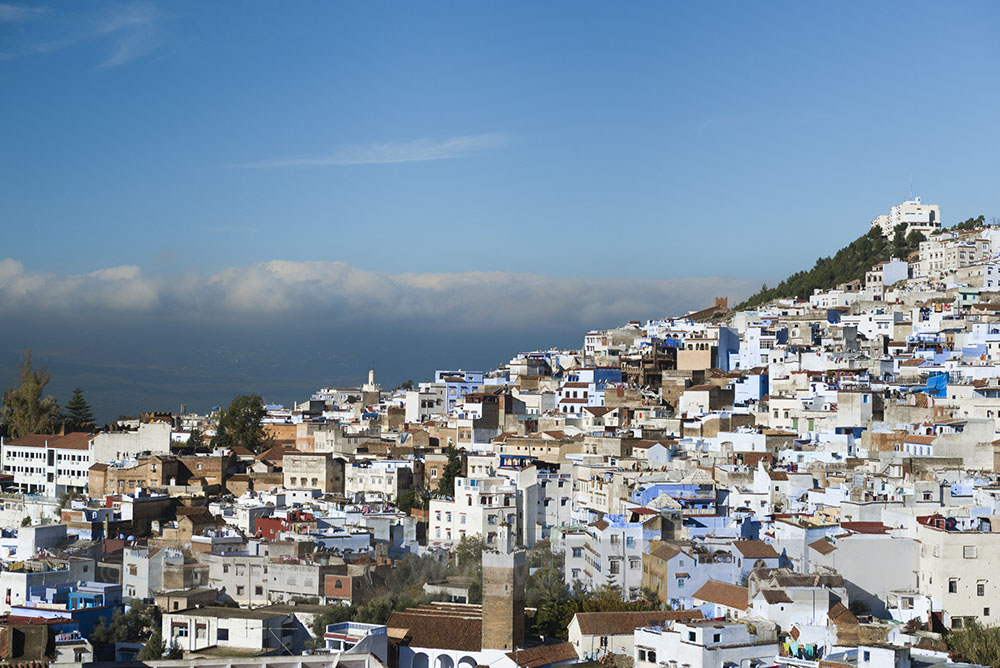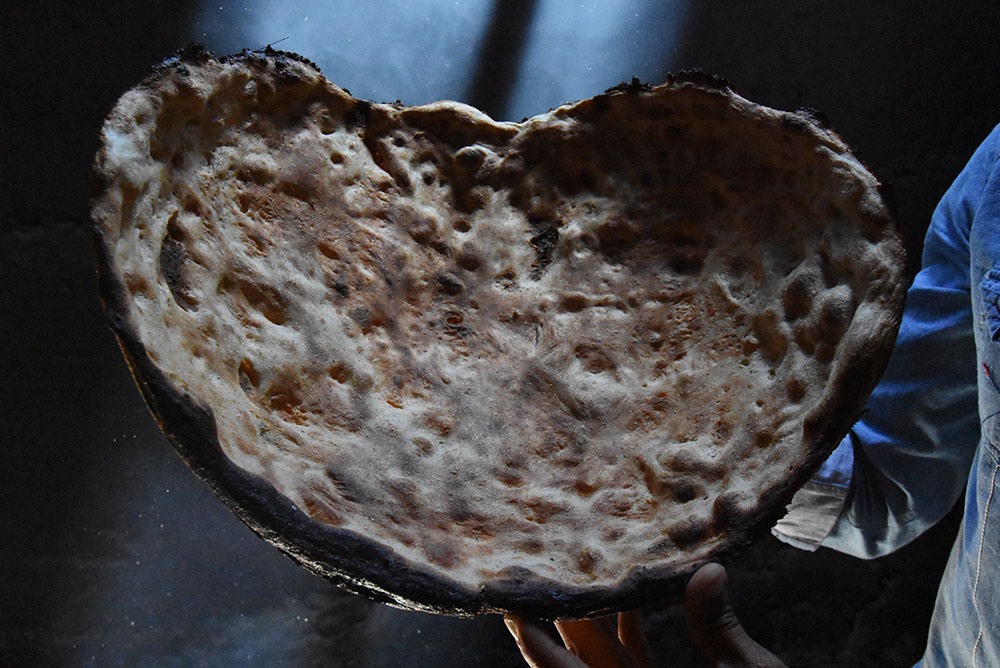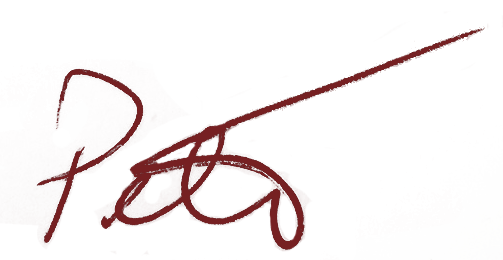In the first report from his spring research trip to Morocco, Peter Schindler gets a surprise on the way to Fes, discovers the Roman ruins at Volubilis and breaks bread with a local family in Skoura…
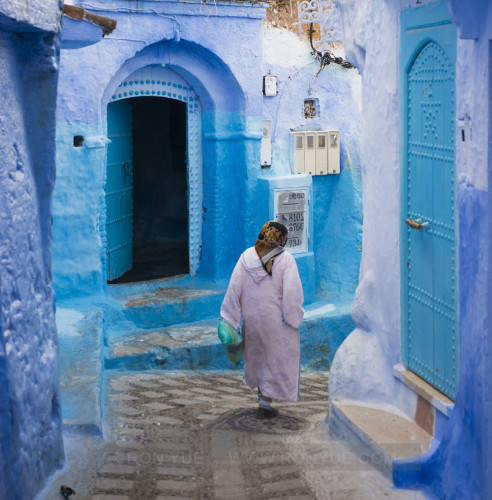 We have only one chance to experience something for the first time. This is obvious. It is also far too easily taken for granted. But not by me today; I am on the road in Africa for the first time in my life. My senses are primed for an adventure.
We have only one chance to experience something for the first time. This is obvious. It is also far too easily taken for granted. But not by me today; I am on the road in Africa for the first time in my life. My senses are primed for an adventure.
To be exact, it was the third day of our Moroccan research trip in April. My wife, Angie, and I had spent our first day driving along Morocco’s northern coast from Rabat via Assilah and Tangiers to Tamouda Bay. Day two had seen us go from there via Tetouan to Chefchaouen, Morocco’s Blue City. On day three we were due to drive from Chefchaouen to Fes.
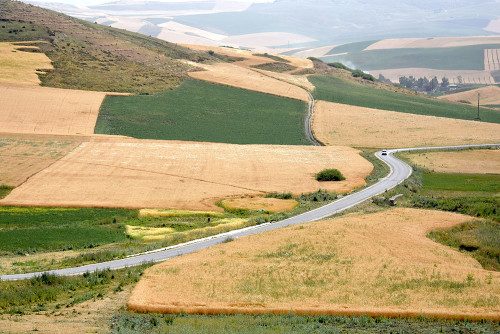 I expect arid, barren, desert-like landscape. Instead, we find ourselves driving on a wide, well-paved road that winds through rolling hills and fields of flowers, vegetables and ripening grain. As far as the eye can see, there is nothing but fertile ground. I can’t believe what I’m seeing, and find myself shaking my head in astonishment. We continue for 10km, 20km, 50km and still there is no end in sight to this agricultural abundance. Are we still in Morocco?
I expect arid, barren, desert-like landscape. Instead, we find ourselves driving on a wide, well-paved road that winds through rolling hills and fields of flowers, vegetables and ripening grain. As far as the eye can see, there is nothing but fertile ground. I can’t believe what I’m seeing, and find myself shaking my head in astonishment. We continue for 10km, 20km, 50km and still there is no end in sight to this agricultural abundance. Are we still in Morocco?
Late that morning, we stop at Volubilis, a partly excavated Berber and Roman city near the modern city of Meknes. It developed from the 3rd century BC onward as a Berber settlement before it became an outpost of the Roman empire. The city expanded and grew rich under Roman rule, eventually covering around 42 hectares, it was enclosed by a wall 2.5km long. Today, it is a UNESCO World Heritage Site. And Volubilis, too, is surrounded by rolling fields that still deliver plentiful crops for the region’s farmers.
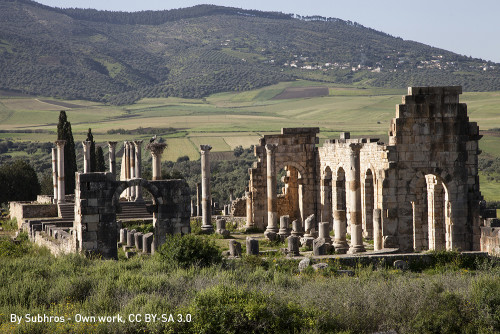 At the Volubilis visitor center I spot a map of the Roman Empire. In a caption telling the story of Volubilis, Morocco features prominently as one of the regions that gave northern Africa the soubriquet “Breadbasket of the Roman Empire”. I had heard the term before, but could not have pointed it out on a map even if my daily bread depended on it. Yet today I find myself in its centre. Only by traveling do we grasp the meaning of places. Or, as the Chinese saying goes, “it is better to travel ten thousand miles than to read ten thousand books” (讀萬卷書不如行萬里路).
At the Volubilis visitor center I spot a map of the Roman Empire. In a caption telling the story of Volubilis, Morocco features prominently as one of the regions that gave northern Africa the soubriquet “Breadbasket of the Roman Empire”. I had heard the term before, but could not have pointed it out on a map even if my daily bread depended on it. Yet today I find myself in its centre. Only by traveling do we grasp the meaning of places. Or, as the Chinese saying goes, “it is better to travel ten thousand miles than to read ten thousand books” (讀萬卷書不如行萬里路).
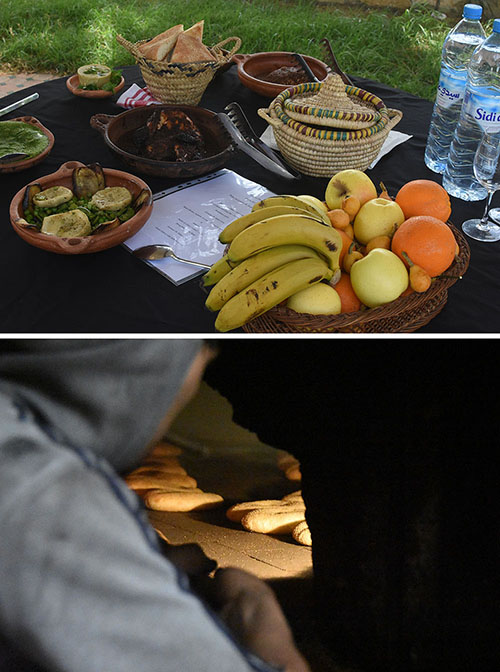 And suddenly, I start noticing bread everywhere, from the breadbaskets that accompany every meal to the communal bread oven that is one of the five institutions found in every Moroccan village. (The other four are: a mosque, a school, a shared fountain and a hammam.)
And suddenly, I start noticing bread everywhere, from the breadbaskets that accompany every meal to the communal bread oven that is one of the five institutions found in every Moroccan village. (The other four are: a mosque, a school, a shared fountain and a hammam.)
Later on during the trip, in Skoura, bread-making returns to become the most profound memory from our journey. A friend, Toufiq, invites us to visit his home. It is a large, but humble mud-brick building. Outside, the sun glares and the heat sears, yet inside the house it is dark and cool. After the formality of greetings and welcome, Toufiq takes us deeper into his house and through an archway.
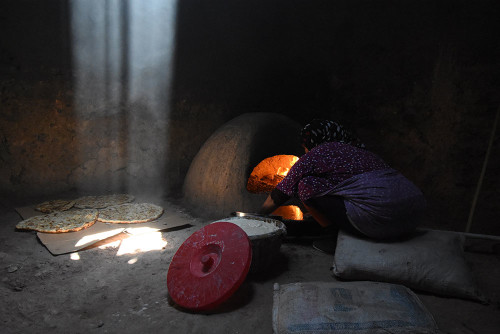 We have to stoop low, very low, to get through. What awaits us is a place like none I’ve ever been in before. The word that comes to mind is “inferno”, but this isn’t hell. This place sustains life, rather than incinerating it, for this is the family’s own bakery. Two ovens rage, emitting intense heat, smoke and flickering light. There is no window, just one skylight, through which pours a solid rod of Maghrebi sunlight.
We have to stoop low, very low, to get through. What awaits us is a place like none I’ve ever been in before. The word that comes to mind is “inferno”, but this isn’t hell. This place sustains life, rather than incinerating it, for this is the family’s own bakery. Two ovens rage, emitting intense heat, smoke and flickering light. There is no window, just one skylight, through which pours a solid rod of Maghrebi sunlight.
As I stand there, my eyes and senses adjusting, my first instinct is to escape from this stifling and claustrophobic space. Yet I follow Toufiq’s lead and crouch to the level of the two women, both members of his family, who are busy baking bread. Down here the heat and the smoke are less intense. With that, curiosity begins to trump discomfort. One woman’s sooty, dexterous hands handle a long-handled peel to move the bread about in the fire to ensure it bakes evenly.
The other eases dough into a metal baking form for a different kind of bread (one for festive occasions) and bakes it in the second oven, removing it deftly to show off the finished product a few minutes later. While working at speed, they merrily chat with Toufiq, completely oblivious to what makes me hold my breath as I watch them, one wrong move by either of them and they would inflict upon themselves deep, scarring burns.
The longer I stayed in that hot, cramped space, the more privileged I felt to partake in an experience that is the most human of all; people laboring to feed themselves, whether they plant and harvest rice, potatoes or wheat. An everyday occurrence in every Moroccan village, but one I had become divorced from – turning the fruit of the land into human sustenance, simply by making bread.
*********
For another great story about making and breaking bread in Morocco, click here.
